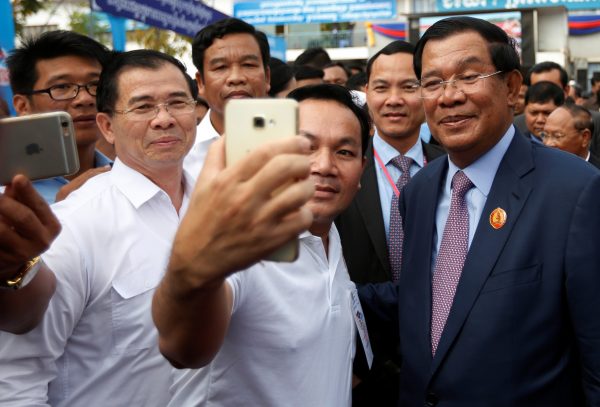, propagandise his party and imprison opposition parliamentarians. Cambodia and the United States may be wholly different countries, but a look at Hun Sen’s Facebook page, the power it exerts over government and recent ‘fake news’ scandals in Cambodia offer valuable lessons for the American public as it prepares for the nation’s first Twitterer-in-Chief.
Six days before the United States inaugurates its 45th President on 20 January, Hun Sen will celebrate his 32nd year as prime minister of Cambodia. Maintaining power for that length of time did not come by chance. A savvy political operator who joined, defected and then defeated the Khmer Rouge in the 1970s, Hun Sen has since outmanoeuvred the royal family, bedevilled the West by drawing closer to Beijing and silenced his domestic opposition through brutal force.
Hun Sen’s embrace of Facebook, which first began in 2013, was a tactical decision to appeal to younger voters after relatively close elections. Today, Hun Sen regularly posts photos of his grandchildren, selfies while globetrotting and collages of himself with peasants or the royal family — all trying to present a ‘cooler’ image to young voters.
Of more concern is that Hun Sen is also using Facebook as a political instrument to control the country and oppress his opponents. Hun Sen is no longer confined to long speeches broadcast on his family-owned television station. Facebook has provided Hun Sen an instant outlet to communicate his wishes and a new space to accuse opposition members of wrongdoing.
His 6.5 million followers, many of whom are alleged to have been purchased, include not only youth but also — and perhaps more importantly — many politicised bureaucrats loyal to the ruling party. Through Facebook Hun Sen has found a way to communicate directly to government officials ready to enact his every statement.
This is legislating through Facebook. In meetings, government officials constantly check their phones to see if Hun Sen has posted his preferred direction on a given policy. In one instance, Hun Sen announced unexpectedly that students who score highly on the national high school exit examination would no longer be granted automatic admission into teacher training centres. Instead, everyone who wants to be a teacher would now have to sit an examination. This ‘new’ policy was the old policy before Hun Sen himself demanded, two years ago, it be changed. His new decision was met with immediate action inside the Ministry of Education, Youth and Sports; laws were changed (again) to satisfy the prime minister. There was no policy discussion, just compliance.
Facebook is also used by Hun Sen’s opponents. His main opposition, Sam Rainsy, uses his Facebook page, which has 3.5 million followers, primarily to criticise the prime minister and post news critical of the ruling party. Sam Rainsy’s favoured political strategy has been stoking Khmer nationalism by exploiting the close ties between Hun Sen and Hanoi. He once moved a boundary post along the porous Cambodian–Vietnam border to protest what he believed was an encroachment onto Cambodian land. His actions, proudly posted on social media, were met with a prison sentence. Sam Rainsy escaped by fleeing abroad.
In a similar incident on 11 August 2015, opposition Senator Hong Sok Hour posted on Sam Rainsy’s Facebook page a border treaty from 1979 between Vietnam and Cambodia. The posting was supposed to provide ‘evidence’ of Cambodia giving land to Vietnam. But the plan backfired: a translation error — the posted document used the word ‘dissolve’ rather than ‘redefine’ to describe the borders — was sufficient for Senator Hong to be accused of ‘forging a public document’, ‘making use of a forged public document’ and ‘inciting the public so as to create trouble and threaten public order’. In other words, he was accused of propagating a fake news story on Facebook. In November, he began a seven-year jail term. In December 2016, Sam Rainsy and two members of his Facebook team were sentenced in absentia for the same acts.
In Cambodia, fake news operates in one direction — always in support of the ruling party. Whereas the supposed ‘fake’ treaty posted on Facebook resulted in four opposition members receiving jail terms, another fake news event in late December was orchestrated by the ruling party with little consequence. This time, an immigration official loyal to the ruling party pretended to be hit by a car driven by Mang Puthy, an opposition parliamentarian. Although footage of the ‘accident’ circulating on social media showed the event was clearly fabricated, Mang Puthy was charged with attempted murder and is awaiting trial in jail.
Facebook in Cambodia has not created transparency, democratised knowledge or instilled respect for opposition parties. Facebook has simply become another tool through which authoritarian power operates, albeit veiled behind selfies aimed at attracting youth voters.
It is not impossible that President Trump could act in a manner similar to Hun Sen. Already Trump is selecting sycophants as cabinet members, talking about packing the courts with loyalists and hiring his children. He might have backed away from campaign statements that he would prosecute Hillary Clinton, but the mere threat of using the courts to target his opponents is significant. Fake news, on which Trump’s campaign thrived, could be turned into ‘evidence’ against his opponents, just like in Cambodia.
The American public must resist the confluence of social media and state power. The charade of transparency, production of propaganda and oppression of opponents through social media is 21st century authoritarianism in action.
Will Brehm is a Japan Society for the Promotion of Science Postdoctoral Research Fellow at the University of Tokyo. He also hosts the podcast FreshEd.

